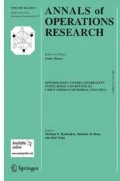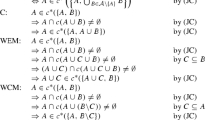Abstract
This paper is concerned with an axiomatic approach to the analysis and construction ofthe utility structure that underlies the values of “opportunity sets”. A family of subsetsof a fixed universal set of alternatives is considered. These subsets are treated as opportunitysets; their (subjective) estimates by some ordinal scale are known. Also consideredis another family of subsets, “alternative bundles;” its assumed mechanism ofgenerating opportunity set values is as follows. Each opportunity set contains some bundles ofalternatives, which have their own hyper-utility values. The value of the opportunity set is the maximum “hyper-utility” over bundles that lie inside the set.We establish necessary and sufficient conditions for opportunity set values to be representableby such a mechanism, with some hyper-utility function for bundles. Particular cases are considered, including the “limit” case where the opportunity set value equals theconventional utility value of the best alternative in the set.
Similar content being viewed by others
References
M.A. Aizerman and A.V. Malishevski, General theory of best variants choice: Some aspects, IEEE Trans. Automatic Control AC-26(1981)1030 – 1041.
S. Barbera, C.R. Barret and P.K. Pattanaik, On some axioms for ranking sets of alternatives, J. Econ. Theory 33(1984)301 – 308.
W. Bossert, On the extension of preferences over a set to the power set: An axiomatic characterization of a quasi-ordering, J. Econ. Theory 49(1989)84 –92.
W. Bossert, P.K. Pattanaik and Y. Xu, Ranking opportunity sets: An axiomatic approach, J. Econ. Theory 63(1994)326 – 345.
H.S. Houthakker, Revealed preference and the utility function, Economica 17(1950)159 – 174.
K.H. Kim and F.W. Roush, Preferences on subsets, J. Math. Psychology 21(1980)279 – 282.
M. Klemisch-Ahlert, Freedom of choice. A comparison of different rankings of opportunity sets, Soc. Choice and Welfare 10(1993)189 – 207.
D.M. Kreps, A representation theorem for “preference for flexibility”, Econometrica 47(1979) 565 – 577.
A.V. Malishevski, Criteria for judging the rationality of decisions in the presence of vague alternatives, Math. Soc. Sciences 26(1993)205 – 247.
A.V. Malishevski, An axiomatic justification of scalar optimization, in: Constructing Scalar-Valued Objective Functions, eds. A.S. Tangian and J. Gruber, Lecture Notes in Economics and Mathematical Systems 453, Springer, Berlin/Heidelberg, 1997, pp. 41 – 52.
D.J. Packard, Preference relations, J. Math. Psychology 19(1979)295–306.
C. Puppe, Freedom of choice and rational decisions, Soc. Choice and Welfare 12(1995)137 – 153.
C. Puppe, An axiomatic approach to “preference for freedom of choice”, J. Econ. Theory 68(1996) 174 – 199.
M.K. Richter, Revealed preference theory, Econometrica 34(1966)635 – 645.
M.K. Richter, Rational choice, in: Preference, Utility, and Demand, eds. J.S. Chipman, L. Hurwicz, M.K. Richter and H.F. Sonnenschein, Harcourt Brace Jovanovich, New York, 1971, pp. 29 – 58.
A.K. Sen, Choice functions and revealed preference, Rev. Econ. Stud. 38(1971)307 – 317.
A.K. Sen, Freedom of choice: Concept and content, European Econ. Rev. 32(1988)269–294.
A.K. Sen, Welfare, preference and freedom, J. Econometrics 50(1991)15 – 29.
Rights and permissions
About this article
Cite this article
Malishevski, A. Generalized utility based on values of opportunity sets. Annals of Operations Research 80, 11–26 (1998). https://doi.org/10.1023/A:1018955612731
Issue Date:
DOI: https://doi.org/10.1023/A:1018955612731




